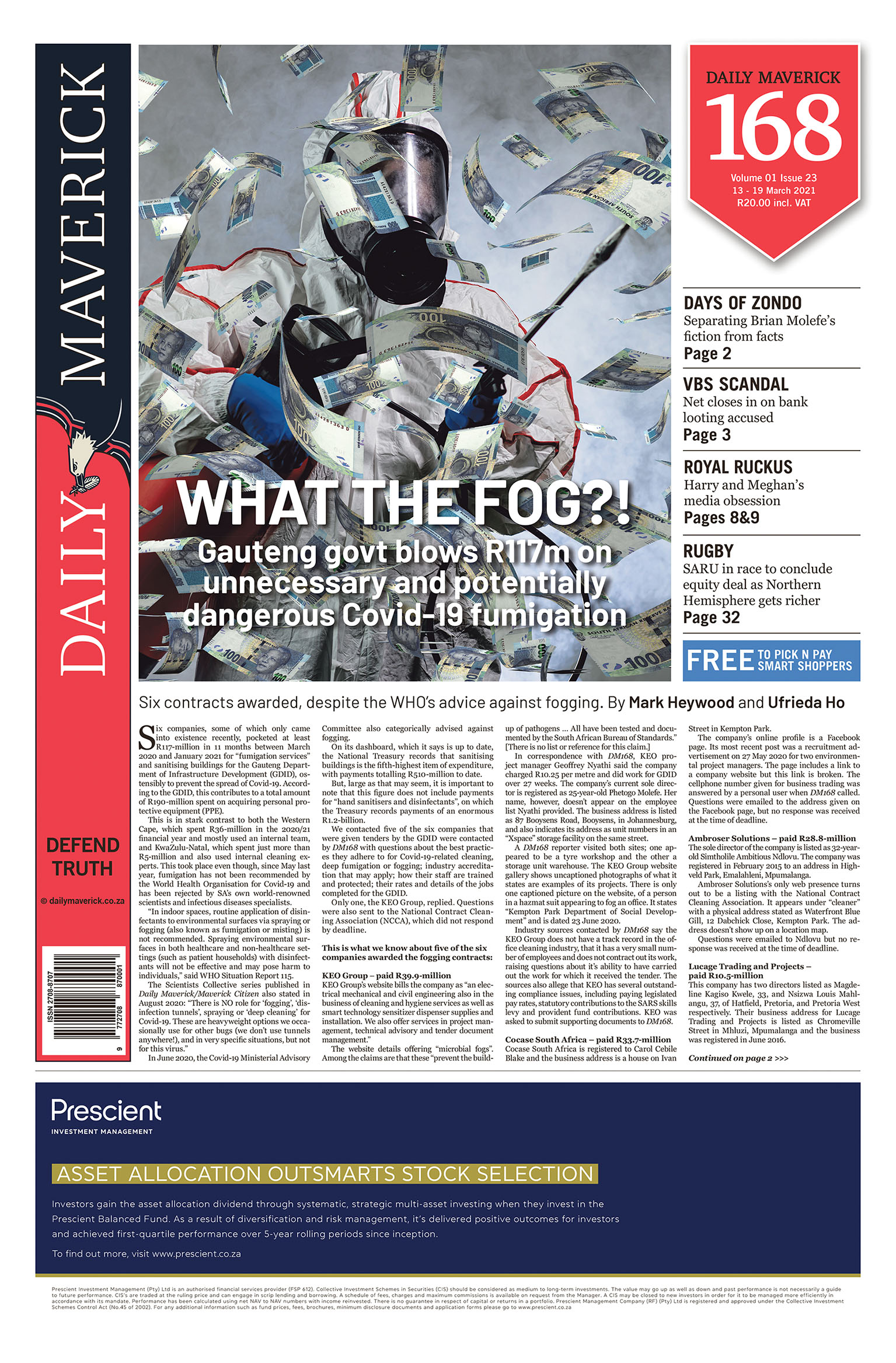BUSINESS MAVERICK 168
Competition Commission steps carefully into the fast-growing online retail space

The Competition Commission has announced an inquiry into the trade practices of dominant e-commerce companies in SA. Could this boost the burgeoning online economy?
First published in the Daily Maverick 168 weekly newspaper.
When Trade and Industry Minister Ebrahim Patel banned e-commerce during the lockdown, about 4,000 logistics and e-commerce businesses signed an open letter written by uAfrica’s Andy Higgins requesting home deliveries of non-essential goods be allowed during the lockdown. The reprieve was granted in mid-May 2020 and South Africa’s e-commerce space has since exploded.
In 2019, less than 2% of South African retail sales were via online platforms, although the sector was growing at 20% a year, according to local research firm World Wide Worx. But this has changed dramatically in the past year as retailers both new and existing have geared up to provide shoppers from pensioners to spaza shop owners with online service offerings ranging from food delivery to telemedicine services.
Kristen’s Kick-Ass Ice Cream survived lockdown by upgrading its website to accommodate orders, payment and delivery; Vuleka, a mobile app, initiated collective bulk-buying, warehousing and distribution of fast-moving consumer goods for spaza shops. This builds credit profiles for informal or unbanked business owners. And, with restaurants closed, both “dark” and light kitchens, along with purveyors of groceries, drove enormous growth in the delivery chain. Statista claims the market for 2020 online food delivery in South Africa was about R8.2-billion.
As small business owners were grappling with routes to market, Facebook stepped up with Facebook Shop, offering digital storefronts to more than 22 million South African users, according to a report from the Small Business Institute, titled Digitalisation: The Best Hope for SA and Small Business, in which much of the research cited was compiled.
Instagram offered product links in story adverts to people and businesses. Since October WhatsApp has allowed users to buy products from its chat interface and offers enterprise tools such as receipts and confirmations. Google announced plans last year to introduce the capacity to buy directly from tutorials or product reviews on YouTube. In addition, local platforms Loot, Wantitall, Takealot, Zando and Superbalist offer space to third-party vendors for all kinds of products, services and sales.
These platforms handle all the showcasing and marketing of products, manage payments, handle online security, and ensure efficient delivery. In exchange, business owners pay the marketplace a fee or a commission on sales.
It may come as a surprise, but the UN’s Digital Marketing Explorer released in May 2020 ranked SA first on the continent with 104 digital marketplaces (they tallied up 630 business-to-consumer marketplaces in Africa, featuring 1,902 websites).
It is into this mêlée that the Competition Commission has waded, first with a strategic review of the digital economy, released in November, and now with the announcement of its intention to conduct a marketplace inquiry into the online intermediaries between goods and service providers and customers. These include e-commerce marketplaces such as Takealot and Superbalist, software app stores, service delivery platforms such as MrD, UberEats, Airbnb and TravelStart, and online classifieds like AutoTrader, cars.co.za, Property24 and Private Property.
“Digital platform markets have been at the forefront of the global competition law debates in recent years due to the growing importance of digital platforms in the economy and the high levels of concentration in many of these markets,” says Tembinkosi Bonakele, the commissioner at the South African Competition Commission. “A number of competition authorities have initiated market inquiries or investigations to address the unique challenges of digital markets.”
The commission’s inquiry follows from its calls for public comment and stakeholder involvement in respect of its September 2020 strategic view on regulating competition in the digital economy.
“The terms of reference note that local digital markets are becoming more concentrated, with a number of ‘clear market leaders and dominant platforms’ in markets like online retail and food delivery,” says Heather Irvine, a partner with law firm Bowmans. “These large platforms are critical for reaching consumers, and business users are dependent on them, particularly small-and-medium enterprises and businesses owned and controlled by historically disadvantaged persons.”
The inquiry will focus on the areas of concern set out in the draft terms of reference, such as whether specific market features, contracts and core terms of use raise any barriers to entry, or reduce competition among the platforms domestically or could be said to be discriminatory or unfair. Arthur Goldstuck, CEO of World Wide Worx, noted that recent policy documents from the Competition Commission suggest it is wrestling with both business and philosophical issues in the digital realm. “When the theoretical underpinning of competition law is being questioned, we know that we are seeing the dawn of a new era in understanding the remedies required.”
Takealot, like many e-commerce players, was unwilling to comment for this story, but a spokesperson from parent company Naspers said it welcomed the opportunity to comment on the inquiry’s terms of reference and remains committed to constructive engagement with the commission.
He adds, however, that although “the rationale of the Competition Commission makes sense, the South African market is still at a very early stage of digital maturity, and the CompCom’s caution regarding overregulation is justified”.
That’s because there are very few digital organisations in this market that are of a size that would allow their mergers or acquisitions to be viewed in the same light as the market dominance that is possible in other sectors. Because the bulk of digital companies are start-ups or operate on a start-up scale, even if they are the most used in their categories in South Africa, they would not be able to remain competitive locally or globally if they were not allowed to merge, acquire or be acquired.
For many tech start-ups, the founding strategy is an exit strategy. It is on this basis that they are able to attract venture capital, and creating a cooling effect on digital mergers and acquisitions would also cool off the already slim funding options. “For these reasons, digital overregulation must be avoided in this market for the foreseeable future, certainly for smaller players and start-ups,” Goldstuck says.
The commission may be concerned it has been too lax in the past. It allowed Takealot to acquire Kalahari.com in 2015, but recently the tribunal prohibited Naspers Group’s acquisition of WeBuyCars because the deal would reduce competition in the car-buying market. Naspers Group owns and operates online classified automotive advertising platforms OLX and AutoTrader.
“The reality is that online marketing is the way of the future,” says Iraj Abedian, economist and CE of Pan African Research, “so getting the right regulatory framework in place for online traders and merchants is critical.
“We have seen collusion and manipulation in the traditional economy, and there is no reason to expect online merchants not to do the same,” he says.
The focus of the inquiry could be Takealot, which is by far and away the biggest multivendor platform in the country.
Takealot, like many e-commerce players, was unwilling to comment for this story, but a spokesperson from parent company Naspers said it welcomed the opportunity to comment on the inquiry’s terms of reference and remains committed to constructive engagement with the commission.
Yet the South African government is not known for having a “light regulatory touch”. This, says Jennifer Cohen, the executive for policy and advocacy at the Small Business Institute, may already act as a disciplining force for large businesses in South Africa.
“It all comes down to what the regulator hopes to achieve. Competition regulators are allergic to dominance, but dominance – a characteristic of digital transformation – doesn’t necessarily harm the smaller players.
“What they need to be looking for is evidence of abuse, or onerous terms for small suppliers – some of which are willing to pay in exchange for the logistics, distribution and other benefits of large digital marketplaces.”
The inquiry will take about 18 months to complete. At worst it may uncover undesirable behaviour; at best it will enable the development of a consistent policy environment that allows digital entrepreneurs to thrive and doesn’t stifle local innovation or deter investment.
The period for comment has been extended to 15 March. DM168
This story first appeared in our weekly Daily Maverick 168 newspaper which is available for free to Pick n Pay Smart Shoppers at these Pick n Pay stores.


















 Become an Insider
Become an Insider
Comments - Please login in order to comment.